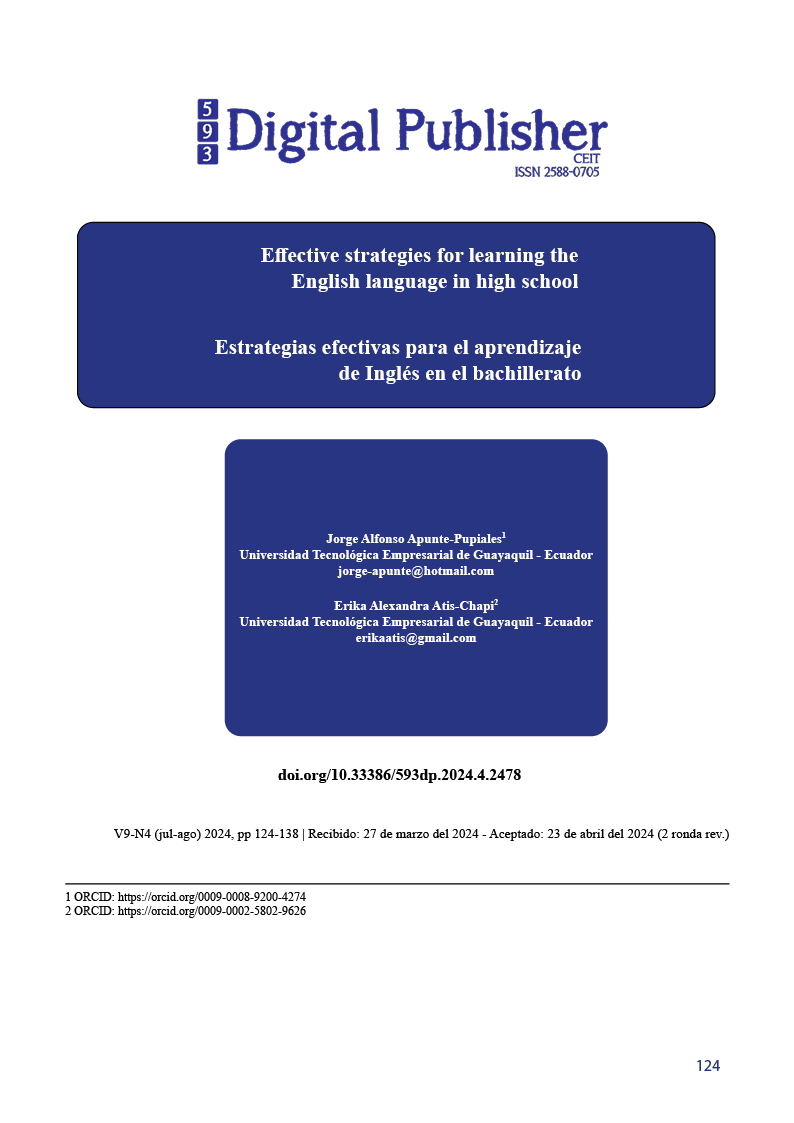Effective strategies for learning the English language in high school
Main Article Content
Abstract
The present study focuses on analyzing the impact of pedagogical practices on the academic performance of third-year high school students in the area of English. The main objective is to identify strategies that improve the oral, written, listening and reading skills in English of third-year high school students, seeking to provide a practical and adaptive framework for the implementation of these strategies in the 11 de Julio Educational Unit. . The research is carried out using a cross-sectional qualitative approach, collecting data through observations, interviews and documentary analysis. The study population included 39 students majoring in Computer Science. The implementation of strategies such as gamification, use of constructivist techniques and promotion of participation in collaborative activities has generated significant progress in the four English skills, proving to be highly effective, considering that a significant increase in participation was observed, as well as notable improvements in oral, written, listening and reading skills in the English language. In this sense, the results are supported by figures that indicate specific progress in each linguistic skill. The conclusions highlight the positivism of the students towards the methodologies used, highlighting the importance of adapting teaching to the preferences and needs of the current generation, thus ensuring their learning. The proposal for critical evaluation and continuous improvement ensures the sustainability and evolution of the educational process, through innovative strategies, encouraging participation and promoting a stimulating and committed learning environment.
Downloads
Article Details

This work is licensed under a Creative Commons Attribution-NonCommercial-ShareAlike 4.0 International License.
1. Derechos de autor
Las obras que se publican en 593 Digital Publisher CEIT están sujetas a los siguientes términos:
1.1. 593 Digital Publisher CEIT, conserva los derechos patrimoniales (copyright) de las obras publicadas, favorece y permite la reutilización de las mismas bajo la licencia Licencia Creative Commons 4.0 de Reconocimiento-NoComercial-CompartirIgual 4.0, por lo cual se pueden copiar, usar, difundir, transmitir y exponer públicamente, siempre que:
1.1.a. Se cite la autoría y fuente original de su publicación (revista, editorial, URL).
1.1.b. No se usen para fines comerciales u onerosos.
1.1.c. Se mencione la existencia y especificaciones de esta licencia de uso.
References
Casado, M. (2016). La gamificación en la enseñanza del inglés en Educación Primaria. https://uvadoc.uva.es/bitstream/handle/10324/18538/TFG-O?sequence=1
De la Torre, E. H., y González, S. (2020). Análisis de datos cualitativos a través del sistema de tablas y matrices en investigación educativa. Revista electrónica interuniversitaria de formación del profesorado, 23(3). https://revistas.um.es/reifop/article/view/435021
Estrada, P. (2022). Estrategia de fomento de uso del inglés liderada por la Escuela de Idiomas y Ciencias Sociales del Campus Tecnológico Local San Carlos (FUI-CTLSC). Revista Ventana, 16(1), 38. https://revistas.tec.ac.cr/index.php/ventana/article/view/6648
Espinoza, E. E. (2020). La investigación cualitativa, una herramienta ética en el ámbito pedagógico. Conrado, 16(75), 103-110. http://scielo.sld.cu/scielo.php?pid=S1990-86442020000400103&script=sci_arttext
Faneite, S. F. A. (2023). Los enfoques de investigación en las Ciencias Sociales. Revista Latinoamericana Ogmios, 3(8), 82-95. https://idicap.com/ojs/index.php/ogmios/article/view/226
García, F. (2018). Propuesta didáctica para el fortalecimiento de la competencia comunicativa en inglés mediante el método activo” Flipped Learning” en los estudiantes de grado sexto y séptimo del Colegio Bilingüe Montessori, Cali. https://repository.unad.edu.co/handle/10596/25562
González, D. (2017). La gamificación como elemento motivador en la enseñanza de una segunda lengua en educación primaria. https://redined.educacion.gob.es/xmlui/handle/11162/168343
Ibarra, M. S., González, A., y Gómez, G. R. (2023). Aportaciones metodológicas para el uso de la entrevista semiestructurada en la investigación educativa a partir de un estudio de caso múltiple. Revista de Investigación Educativa, 41(2), 501-522. https://revistas.um.es/rie/article/view/546401
Marín, F. (2019). Aula invertida y aprendizaje basado en tareas a través de las TIC para el aprendizaje del inglés. Revista Vinculando. . https://vinculando.org/beta/aula-invertida-y-aprendizaje-basado-en-tareas-a-traves-de-las-tic-para-el-aprendizaje-del-ingles.html
Mucha, L. F., Chamorro, R., Oseda, M. E., y Alania, R. D. (2021). Evaluación de procedimientos empleados para determinar la población y muestra en trabajos de investigación de posgrado. Desafíos, 12(1), 50-57. http://revistas.udh.edu.pe/index.php/udh/article/view/253e
Navarra, J. M. (2020). Aprendizaje transversal a partir del área de lengua y literatura. Innovación educativa, (30), 21-39. https://revistas.usc.gal/index.php/ie/article/view/7111
Ortega, C. P. C., Criollo, S. N. B., y Guano, D. F. (2020). ¿ Qué habilidad lingüística se hace más compleja enseñar en el aula de inglés como Lengua Extranjera?. Dominio de las Ciencias, 6(3), 302-318. https://dialnet.unirioja.es/servlet/articulo?codigo=7491394
Peñaloza, J., Correa, Y., & Ropero, L. (2023). La Gamificación y el uso de las TIC como Estrategia de Enseñanza y Aprendizaje en el Aula. https://repository.ucc.edu.co/entities/publication/203c9cfc-fe44-4455-8930-e0d64fe8af39
Reyes, J. J., Cárdenas, M. P., y Plua, K. A. (2020). Consideraciones acerca del cumplimiento de los principios éticos en la investigación científica. Conrado, 16(77), 154-161. http://scielo.sld.cu/scielo.php?pid=S1990-86442020000600154&script=sci_arttext&tlng=en
Rezabala, D. C., y Rivadeneira, J. C. (2023). Uso de las redes sociales para el aprendizaje del idioma Inglés. MQRInvestigar, 7(4), 1284-1320. http://www.investigarmqr.com/ojs/index.php/mqr/article/view/761
Rojano, Y., Contreras, M., y Cardona, D. (2021). El proceso etnográfico y la gestión estratégica de datos cualitativos con la utilización del aplicativo Atlas. ti. Saber, Ciencia y Libertad, 16(2), 175-192. https://revistas.unilibre.edu.co/index.php/saber/article/view/6500
Romero, B. J., López, W. C., y Toxqui, Á. R. (2021). Intencionalidades y resistencias en el aprendizaje del inglés: referentes para diseñar estrategias didácticas efectivas. IE Revista de Investigación Educativa de la REDIECH, 12. https://www.redalyc.org/journal/5216/521665144015/521665144015.pdf
Sánchez, M. J., Fernández, M., y Diaz, J. C. (2021). Técnicas e instrumentos de recolección de información: análisis y procesamiento realizado por el investigador cualitativo. Revista científica UISRAEL, 8(1), 107-121. http://scielo.senescyt.gob.ec/scielo.php?pid=S2631-27862021000300107&script=sci_arttext
Tigrero, A. (2022). Aplicaciones tecnológicas móviles y destrezas de comunicación oral del idioma inglés en los estudiantes de la unidad educativa Cascol, año 2021. https://repositorio.upse.edu.ec/handle/46000/6710
Vergara, C. (2021). La gamificación y el fortalecimiento de la habilidad oral en inglés a niños de primera infancia. Revista de Investigación, Desarrollo e Innovación, 11(3), 569-578. https://doi.org/10.19053/20278306.v11.n3.2021.13355



